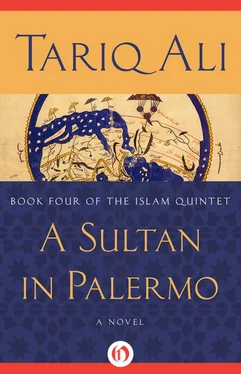‘Nothing changes here. But it will soon. We are living in someone else’s time.’
And then a strange-looking man, whom Idrisi had barely noticed, came forward and inspected the new arrivals. He had long grey hair, which almost touched his shoulders, a bedraggled beard, which covered most of his emaciated face, and a pair of fierce, piercing eyes that dominated his features. He wore a clean white tunic, which clashed with his appearance. In his right hand he held a battered old staff and it was this he now banged on the ground as he spoke.
‘No!’ shouted the man, whose age it was difficult to ascertain. ‘Umar Ibn Ali speaks without thinking. It is the infidels who live in our time and we let them.’
Having made this pronouncement he walked away without acknowledging anyone else’s presence. Idrisi smiled. He was not impressed. Talk of this sort was not uncommon in Palermo. He realised this was the man of whom Abu Khalid had spoken in Siracusa.
As they entered the house his daughter, Samar, greeted him in exaggerated tones. No longer capable of pretence, he touched her head in a perfunctory fashion. A set of rooms had been prepared for him and his grandson led him there.
‘Jiddu,’ asked Khalid, ‘do you like my father?’
The question took him by surprise.
‘Why do you ask such a question, my child. If I did not like your father would I have a spent an unbearably hot day journeying with him to his house?’
Khalid began to laugh. ‘I only asked. I’m happy.’
‘How many rooms are there in this palace?’
‘Thirty-four,’ Khalid replied. ‘I have counted them many times.’
‘Now tell me something else. What do you think of that strange man with long hair, who spoke so rudely to your uncle?’
The boy’s face became serious. ‘He frightens me sometimes, but when he sees I am scared he smiles and tries to make me laugh. His name is al-Farid, but everyone calls him the Trusted One. He is very poor and travels from village to village where they take turns to feed him. But he couldn’t be eating too much. He’s very thin. I think he prefers to drink goat’s milk with a piece of bread. Abu says he is a great story-teller.’
A retainer entered with a basin and a large jug with water. Idrisi smiled and kissed the boy’s head.
Khalid took his leave gracefully. ‘I will see you later, Jiddu. There is a lot of meat being cooked for our feast tonight.’
Idrisi washed his hands and face and then allowed the retainer to wash the dust off his feet. The sun had almost disappeared and the muezzin in the village mosque was summoning Believers to the evening prayer. Idrisi covered his head and began to pray. At times of uncertainty, he thought, there is an inner comfort to be derived through prayer. He recalled that his father had described how, after Palermo was occupied by the Franks, many who had not prayed regularly began to attend the Friday prayers at the Great Mosque. For a long time, according to his father, the melancholy cadences of the call to prayer had affected every Believer in the city.
The very size of the midday gathering each Friday enables Believers to derive strength from each other. He had always understood that, but it was only recently that he had experienced the feeling himself. In fact, only two weeks ago when he was informed of the fate that awaited Philip.
The evening meal, as Khalid had warned, consisted of a great variety of meat cooked to honour the visitor. Had it not been for Umar’s presence it is doubtful whether any vegetables would have been prepared at all. Idrisi tasted a morsel each from the grilled and stewed meats and exclaimed loudly and appreciatively how tasty they were, but he concentrated on eating the vegetables, raw and cooked, that had been placed before Umar.
‘A word of advice for all of you,’ Idrisi addressed the table as they waited for the sweet dishes. ‘I have travelled to many hot countries and in the summer months very little meat is eaten. Any physician will tell you that meat in the summer produces a heaviness of the heart and slows the flow of blood to vital parts of the body.’
Umar smiled. ‘And because Ibn Muhammad is saying this you might take it seriously.’
As platters of fresh fruits were being served there was a loud noise in the distance. The men exchanged uneasy glances as a retainer hurried in to whisper in Abu Khalid’s ear. His face relaxed.
‘I think the Trusted One is trying to attract our attention. He lit a small explosive to show his followers how the Franks can be defeated. If Ibn Muhammad is not too tired we could walk across to the village and hear his message.’
Idrisi rose from the table. ‘A short walk after a meal improves the digestion. Is it too late for Khalid to accompany us?’
Both parents agreed that the best place for Khalid was bed, a decision he accepted with extreme reluctance.
The night was warm and still. As the men walked out of the house, Idrisi looked up at the sky and felt reassured. In front of them retainers carrying oil lamps lit the way to the village. As they neared they could hear chants from al-Quran, but the rhythm and style were different to anything heard in the mosques of Palermo and Siracusa or, for that matter, anywhere else. The Trusted One was reading the verses in short, staccato bursts and his listeners were responding in explosions.
When they reached the village square, Idrisi observed the makeshift mosque with its single minaret. There were at least two hundred men present and each of them had his face covered. The Trusted One had told them to be careful and not to trust anyone in the months that lay ahead. His eyes fell on Idrisi as he leapt to the small platform at the top of the square and began to preach.
‘Look around you, Believers, and see who has come to join us tonight. Abu Khalid and Umar ibn Ali we know and respect. They have given me alms and provided me with shelter and they make sure that all of you and your families are fed when times are bad. But they have a special visitor with them. A great scholar from Palermo, he is a trusted counsellor of the Sultan Rujari. Muhammad ibn Muhammad al-Idrisi. Have you heard of him?’
They shook their heads to indicate their ignorance. Idrisi repressed a chuckle. He knew the influence that men like this preacher could wield over the poor and he understood why. Abu Khalid had given him an account of the man and how he lived.
Al-Farid’s way of life excited admiration. He lived on alms but would never take more than he required for his daily needs, which were, in any case, modest. He refused all the gifts offered by the landed gentry of Catania, who were beginning to get worried. He did not sleep in a single place for long and when he needed a bed, he insisted on a wooden plank or a cloth placed on the ground. He spent most of his time with the poorest people in the village and it was they who sought him out and spoke to him of their problems. A few of them followed him from village to village and absorbed his message so completely that he sometimes sent one of them to distant regions to preach on his behalf. Despite the growing support for him, he remained remarkably detached and, unlike similar preachers in the past, he showed no signs of delirium or hallucinations. He subjected his body to terrible privations, often undertaking prolonged fasts to test his strength. This rude self-discipline had almost cost him his life. If a passer-by had not forced him to drink water and break bread he would have died. Umar had prepared special herbal mixtures and a careful diet of wild berries and vegetable broth to aid his recovery.
After every victory his body had achieved he would stand up, his face rigid and mask-like, and begin to dance, a strange ritual that nobody in the region had ever seen before, and all the while he would sing songs he had made up in praise of Allah. Legends sprang up about him and he was soon asked to resolve disputes between the peasants in various villages. For ten years or more his word was accepted as the final judgement and he had a huge following in every village. News of the arrival of the Trusted One would spread through the fields and that evening a mehfil would take place where the peasants would speak their bitternesses aloud.
Читать дальше












